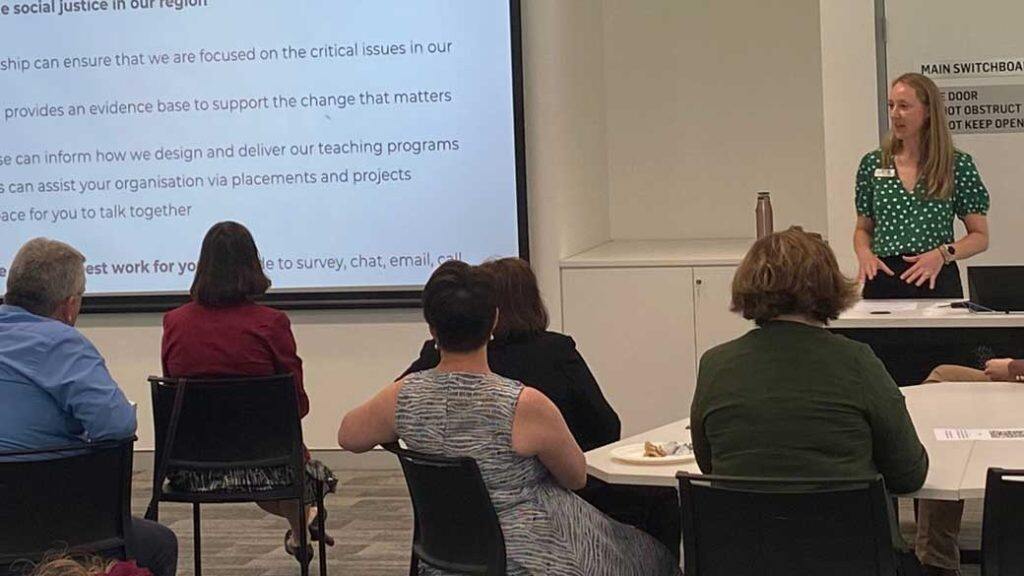The University of Wollongong (UOW) launched the inaugural Criminology and Social Policy Hub event on Tuesday 14 November, designed to provide a space for collaboration to influence future policy and practice, and provide strong work-ready learning opportunities for students.


Led by the Criminology and Social Policy discipline, the launch brought together community, government organisations, and UOW academics with the aim to discover new ways to work on research and policy development.
Senior Lecturer in Criminology, Dr Natalia Hanley, from the School of Health and Society, said the Hub came about because of the need to tackle social justice issues holistically and collaboratively, drawing on evidence and a variety of expertise.
“Criminal and social justice issues are really interconnected; you can’t talk about domestic and family violence, for example, without talking about housing, health, and financial support,” Dr Hanley said.
“We know that all of these social or criminal issues require lots of different people to be involved in a variety of ways to make a positive impact.”
The Criminology and Social Policy Hub aims to promote social justice by providing a space where stakeholders from community, industry, government and the University can meet face-to-face and leverage existing networks to collaborate.
“The community organisations and government agencies that we work with have a lot of knowledge and information about what might work and what support people need, but they are busy delivering services, they do not always have capacity to do a lot with that information.
“We have a lot of highly engaged, highly motivated, enthusiastic advocates in this region and we are lucky that because it is a small region people have great networks and strong relationships and are keen to work together for the benefit of our communities,” Dr Hanley said.
The Hub also aims to prepare a strong graduate workforce for the region.
“As researchers, high quality information is our currency. We have a lot of undergraduate, honours and PhD students who want to do something meaningful that is going to make a positive difference in policy and practice.
“There is an opportunity for us to provide a wonderful experience for our students and provide something very useful for community and government organisations if we are all able to get into a room together,” Dr Hanley said.
More than 60 people attended the launch with representatives from diverse organisations including NSW Department of Communities and Justice, NSW Health, Southern Youth and Family Services, Legal Aid, NSW Police Force, the four local councils, Illawarra Multicultural Services and more, in attendance.
Criminology and Social Policy experts from UOW presented findings from the CommunityMATTERSsurvey of Illawarra and Shoalhaven residents during the launch event. The annual survey uses innovative methods to understand public perceptions of key social policy issues in the region.
CommunityMATTERS is an initiative of the Illawarra and Shoalhaven Social Research and Education Enterprise, a project co–funded by UOW and the Illawarra and Shoalhaven Joint Organisation.
The study focused on the perceptions people have about the Illawarra and Shoalhaven region and their local community, as well as their experience of accessing local services.
The survey included questions about their local neighbourhood, and their personal experience of accessing key health and social services across the region.
Dr Delia Rambaldini-Gooding, Cameron Langfield, and Dr Natalia Hanley presented an overview of the survey results including insights into migrant and refugee communities, youth crime, and wildlife crime.
The survey findings will be used to better understand the diverse experiences and needs of the Illawarra and Shoalhaven region to influence future policy, helping local, state, and federal government better plan for the needs of the community.
UOW Vice Chancellor and President Professor Patricia M. Davidson opened the Criminology and Social Policy Hub at the launch and said the Hub is the ideal place for the exploration of multi-disciplinary research with industry partners.
“This is an exciting opportunity to connect the dots between research advocacy, practise, and teaching to create strong relationships to shape future policy,” Professor Davidson said.
“By developing strong community partnerships and collaborations, UOW is putting our research expertise front and centre, adding valuable insight and influencing solutions in some of the most complex areas of social policy.”






































